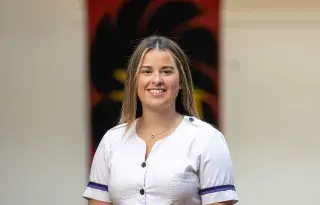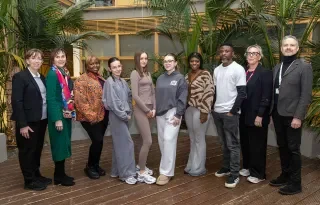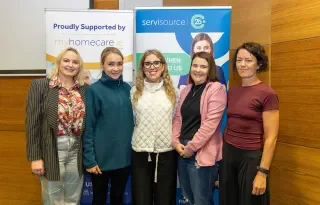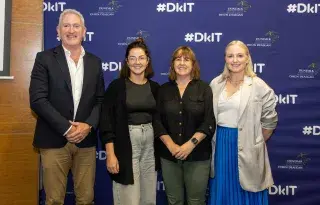BSc (Hons) in Intellectual Disability Nursing
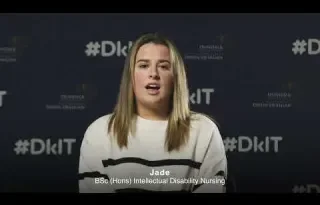
Search to find a different course
Course Overview
Over the duration of the course, students will develop the knowledge, skills and attitudes necessary to meet the specific needs of people with an intellectual disability in a safe, competent, and compassionate manner. Student’s academic and clinical knowledge will be developed throughout this rewarding course using simulated learning environments and modern learning spaces.
Students gain their clinical experience in a diversity of placements, caring for people with an intellectual disability across their lifespan. Intellectual disability nursing placements account for approximately fifty percent of this course. Students will receive theoretical classes in nursing related subjects, psychology, sociology, biological sciences, research and management. It also includes practical sessions in the Clinical Skills Laboratory, in preparation for clinical placements.
What makes this course different
Employment Opportunities
100% of Intellectual Disability Nursing graduates are in employment after 6 months of graduating, with 92% earning between €30-60k (DkIT/HEA Graduate Survey)
Professional Accreditations
Graduates will be eligible for professional registration with the Nursing and Midwifery Board of Ireland (NMBI).
Placements Each Year
Clinical practice placements in each year and a 36-week internship placement in Year 4.
Understanding the Industry
The Intellectual Disability nurse practices in a diverse range of roles and settings across the lifespan with people with an intellectual disability. People with an intellectual disability often present with a wide range of additional and complex physical and mental health needs that can be compounded by communication difficulties. The Intellectual Disability nurse works in partnership with the person, their family and allied healthcare professionals, to provide specialist healthcare, and support that is socially inclusive. They support the person to live their lives as fully and independently as possible, while respecting their rights and dignity.
Career Opportunities
Graduates can apply to practice as a Registered Nurse Intellectual Disability in Ireland and throughout the UK and EU. Graduates can apply for positions at Staff Nurse grade in the Irish healthcare Sector.
Future Careers:
- Registered Intellectual Disability Nurse (RNID)
- Clinical Career Pathway (Specialist and Advanced Practice)
- Management Roles
- Education
- Research
In these areas:
- Community living
- Supported living
- Respite services
- Early intervention and child services
- Primary care
- Adult and child day services
- Home-based care
- Specialist schools
- Higher education institutions
Course Delivery and Modules
- Safe Health care practice 1
- Introduction to Intellectual Disability
- Natural Sciences for Nursing
- Transition Support and Skills for Success
- Practice Placement 1 Intellectual Disability
- Genetics of Intellectual Disability
- Communication in Intellectual Disabilities
- Learning to Learn Skills for Success
- Natural Sciences for Intellectual Disability and Mental Health Nursing
- Nursing Practice in Intellectual Disabilities 1
- Practice Placement 2 Intellectual Disability
- Psychosocial Aspects of Health
- Intellectual Disability across the Child and Adolescent Lifespan
- Nursing Practice in Intellectual Disability 2
- Physical Health Needs of Adults with an Intellectual Disability 1
- Supporting Transitions in Intellectual Disabilities
- Practice Placement 3 Intellectual Disability
- Approaches in Supporting Positive Behaviour
- Exploring the Evidence
- Physical Health Needs of Adults with an Intellectual Disability 2
- Practice Placement 4 Intellectual Disability
- Nursing Practice in Intellectual Disabilities 3
- Person-Centred Care and Complex Needs
- Positive Mental Health in Intellectual Disabilities
- Quality Risk and Safety in Healthcare
- Ethical and Legal Practice in Intellectual Disability Nursing
- Neurobiological Disorders
- Critiquing the evidence
- Health Promotion and Chronic Illness Management
- Practice Placement 5 Intellectual Disability
- Practice Placement 6 Intellectual Disability
- Ageing in Intellectual Disabilities and Palliative Care
- Applying the evidence
- Leadership and Management
- Practice Placement 6 Intellectual Disability
- Internship Intellectual Disability Nursing
Work placement
Clinical placements occur in each year of the programme. In Year 4, the student is an intern for 36 weeks and is employed and paid as part of the service. Each placement supports the student to develop their clinical competence to become a Registered Nurse Intellectual Disability (RNID).
Professional Accreditations
Graduates will be eligible for professional registration with the Nursing and Midwifery Board of Ireland (NMBI).
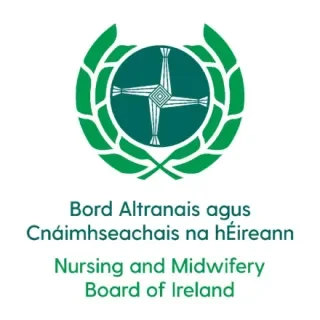
Education Progression
Graduates are also qualified to apply for a range of postgraduate programmes in nursing such as the Postgraduate Cert/Diploma/ MSc in Specialist/Advanced Nursing.
MSc in Professional Nursing
Certificate in Leadership, Management and Quality Initiatives in Intellectual Disability Services
Fees and Funding
Please find information on fees and funding here: www.dkit.ie/fees
Entry requirements
In addition to the standard entry requirements below, a Laboratory Science subject at Grade O6 or H7 is also required. Applicants from NI/UK require a GCSE pass in a Laboratory Science subject (Biology, Chemistry or Physics) or GCSE Grade CC in Double Award Science. Single award GCSE Science is not applicable.
- Standard Requirements for Leaving Certificate Applicants
- Standard Requirements for UK/NI Applicants
- Standard Requirements for QQI-Further Education Applicants
- Mature Applicants: Minimum of 23 years of age on January 1st of year of application. The PAS carries out an assessment test on behalf of NMBI. Visit NursingCareers.ie for more information.
Please Note: Offers subject to successful Garda Clearance and Health Status Clearance from the Health Service Executive (North East) Occupational Health Unit. Students on the course are also subject to fitness-to-practice regulations.
Recent CAO points
How to apply
Apply on CAO
All standard entry first-year applicants must apply for entry through the CAO. See Important application dates for CAO and information for specific applicant types below:
Advanced Entry & Transfer Applications
Advanced Entry is for applicants who have previous educational achievements and/or work experience and want to be considered for direct entry into year 2, 3, or 4 of a course. This includes students looking to transfer to DkIT from another Higher Education provider.
Ask us a Question
If you have a question about the BSc (Hons) in Intellectual Disability Nursing please ask it below and we will get back to you.
Course News
View all NewsDisclaimer: All module titles are subject to change and for indicative purposes only. All courses are delivered subject to demand and timetables are subject to change. Elective Module options will only run subject to student numbers. The relevant Department will determine the viability of each elective module option proceeding depending on the number of students who choose that option. Students will be offered alternative elective modules on their programme should their preferred elective option not be proceeding. Award Options for Common Entry Programmes: The relevant Department will determine the viability of each award option proceeding depending on the number of students who choose either option. If the numbers for one of the Award options exceed available places, students for this option will be selected based on Academic Merit (highest grades).
